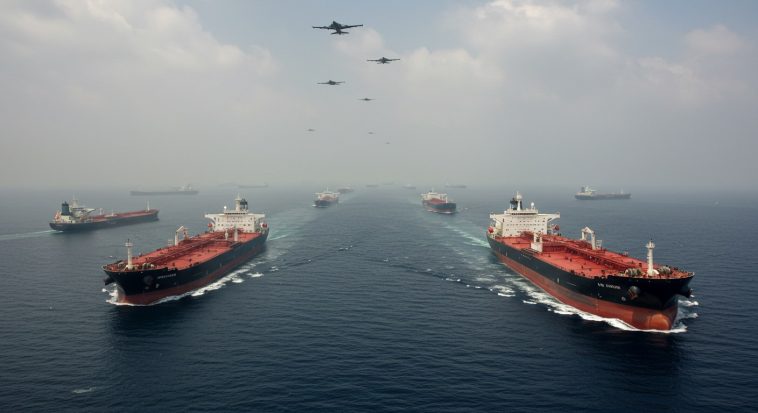Last Friday, tensions in the Middle East over oil really shook up financial markets. After Israel targeted Iranian sites, the price of Brent crude surged over 7%, its biggest jump in several months. Gold prices also rose, nearing record levels. As a result, airline stocks took a hit while defense companies saw gains. Many investors sought safer options, anticipating potential further instability in the region.
Markets Rattle Amid Military Escalation
The financial markets reacted quickly and across the globe. Brent crude oil prices briefly surpassed $75 a barrel, the highest level since April, before dipping back a bit. Gold also saw a rise, climbing 1% to reach $3,426 an ounce, inching closer to its previous record of $3,500 from April.
These changes came after Israel conducted strikes, labeling them as a “pre-emptive action” against Iran’s nuclear efforts, which led to retaliatory drone attacks from Tehran. In light of this, Israel announced a state of emergency.
Louise Trent, a senior analyst at Merrill Stratton & Co., noted that the markets were already on edge, and this situation only added fuel to the fire, both literally and figuratively. She explained that energy prices react strongly to disturbances in the Middle East, and we’re witnessing that unfold right now.
The aviation industry felt the impact immediately, with British Airways’ parent company, IAG, dropping 3.7% on the FTSE 100 in London. EasyJet fell by 2.7%, while major U.S. airlines like Delta, United, and American saw their stock prices decline due to concerns over increasing fuel costs and potential airspace restrictions.
On the flip side, defense stocks saw a boost. Shares in BAE Systems rose nearly 3%, while oil giants like BP and Shell also gained as crude prices surged.
Safe Havens Shine as Investors Seek Shelter
Gold wasn’t the only safe option drawing attention from investors lately. U.S. Treasury yields fell, with the 10-year note dropping to 4.31%, the lowest it’s been in about a month. This shift happened as many investors moved their money away from stocks and sought safer places to park their cash.
Charu Chanana, who’s the chief investment strategist at Saxo, noted that the rising global tensions are adding even more unease to an already shaky market. She remarked, “People are clearly looking for safety, and it’s going to take a lot to ease their worries.”
Stock markets also took a hit around the world. Japan’s Nikkei index fell by 1.3%, South Korea’s Kospi dropped 1.1%, and Hong Kong’s Hang Seng decreased by 0.8%. In Europe, major indexes like Germany’s DAX, France’s CAC 40, and Italy’s FTSE MIB all nosedived by at least 1%. Over on Wall Street, early trading reflected this trend, with noticeable declines especially affecting the energy, transport, and manufacturing sectors.
Maritime Choke Points Back in Focus
Lately, there’s been a lot of talk about instability in the markets, but what’s really concerning are the potential blockages in global energy and trade routes.
The Strait of Hormuz, which borders Iran, is critical because about 20% of the world’s oil and an even bigger share of liquefied natural gas pass through it. With worries about possible disruptions escalating, there are growing anxieties about how this could impact supply chains.
Derren Nathan, who leads equity research at Hargreaves Lansdown, pointed out that the implications go beyond just oil tankers. If access to Hormuz is restricted, it could also affect the transport of grain, containers, and LNG. This strait is a major bottleneck for global trade.
In response to these concerns, the UK’s Department for Transport has advised British ships to steer clear of the Red Sea and the Gulf of Aden. At the same time, Greek shipping authorities have asked carriers to provide detailed plans before entering the strait. Shipping expert Peter Sand from Xeneta warned that if things take a turn for the worse, we could see global freight rerouted around Africa’s Cape of Good Hope, significantly delaying deliveries and increasing costs. He mentioned that a return to the Red Sea corridor seems unlikely since the potential risks currently outweigh any benefits.
Gas Facilities Halt Operations
The recent geopolitical tensions are affecting local energy production. Energean, a UK company, has paused its work at a gas platform off northern Israel after being instructed to do so by Israeli officials. An Energean representative shared that stopping production seemed like the wise choice given the current risks and uncertainty.
What’s Next? Oil Markets on Edge
The oil situation in the Middle East is getting more unstable, and experts are feeling uneasy about the future. Rachel Hwang, an energy strategist at Polaris Capital, mentioned that we’re at a crucial moment in geopolitics. This situation goes beyond just Israel and Iran; it affects the overall stability of a region vital for global energy. What happens next will determine if oil prices stay steady or climb again, and everyone is preparing for potential bumps ahead in both the markets and daily life.



